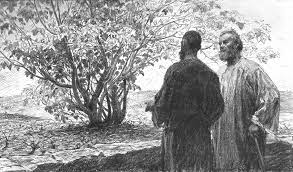
Some people told Jesus about the Galileanswhose blood Pilate had mingled with the blood of their sacrifices.Jesus said to them in reply,“Do you think that because these Galileans suffered in this waythey were greater sinners than all other Galileans?By no means!But I tell you, if you do not repent,you will all perish as they did!Or those eighteen people who were killedwhen the tower at Siloam fell on them—do you think they were more guiltythan everyone else who lived in Jerusalem?By no means!But I tell you, if you do not repent,you will all perish as they did!”And he told them this parable:“There once was a person who had a fig tree planted in his orchard,and when he came in search of fruit on it but found none,he said to the gardener,‘For three years now I have come in search of fruit on this fig treebut have found none.So cut it down.Why should it exhaust the soil?’He said to him in reply,‘Sir, leave it for this year also,and I shall cultivate the ground around it and fertilize it;it may bear fruit in the future.If not you can cut it down.’” (Lk 13:1-9)
The Gospel passage begins with people talking about some Galileans who were killed by Pilate. With his ruthless acts of terror, Pilate was considered a ‘madman’ by the people under Roman occupation including Jews and Samaritans. The Jewish historian Josephus recorded that Pilate had disrupted a religious gathering of the Samaritans on Mount Gerizim with a slaughter of the participants (Antiquities 18:86–87), and therefore the slaughter of the Galileans in Luke’s Gospel, whose blood Pilate mingled with the blood of their sacrifices, would be something that Pilate would no doubt had done.
Jesus used that occasion to teach the people that just because some people die in a gruesome or an untimely death does not mean that they were greater sinners than the rest of them. Just think of the martyrs who were tortured and killed. Let’s face it. Good things happen to wicked people while bad things happen to good people. But when we start judging who’s good or bad depending on the good or bad things that happen to them in this life, then we are making a big mistake. The murder of the Galileans at the hands of Pilate (Lk 13:1) and the accidental death of those on whom the tower at Siloam fell (Lk 13:4) were incidents which Jesus used to preach to the people of the need for all to repent. People who think that they have no need of repentance are the ones who most need to repent.
The parable of the barren fig tree broadens the call to repentance to another important point – God’s patience. But when we speak of the patience of God, we are not talking about God enduring hard times until things get better; rather, we are talking about God being patient with people who continue to ignore Him. Scripture reminds us of it; it says: “Merciful and gracious is the LORD, slow to anger, abounding in mercy. (Ps 103:8)” The parable of the barren fig tree teaches us that God continues to be patient with those who have not yet repented (cf. Lk 3:8). How remarkable it is that people repent in so different ways, times and places, and yet God allows each person to come to Him in their own way. It is a testament to God’s great patience. However, the time to repent is now, because despite God’s patience and the number of chances that He has given us, the delay of our time of reckoning is not forever and it will come when we least expect it.